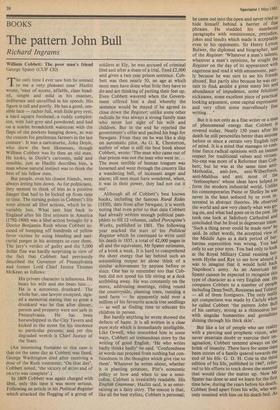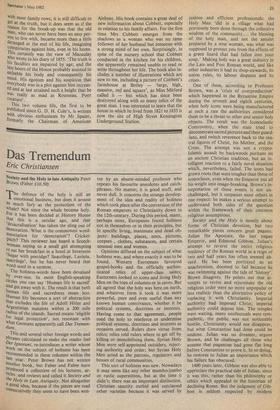BOOKS
The pattern John Bull
Richard Ingrams
William Cobbett: The poor man's friend George Spater (CUP £30) `ri" he only time I ever saw him he seemed 1 to me a very pleasant man' Hazlitt wrote, 'easy of access, affable, clear head- ed, simple and mild in his manner, deliberate and unruffled in his speech. His figure is tall and portly. He has a good, sen- sible face — rather full, with little grey eyes, a hard square forehead, a ruddy complex- ion, with hair grey and powdered; and had on a scarlet broadcloth waistcoat with the flaps of the pockets hanging down, as was the custom for gentleman farmers in the last century'. It was a caricaturist, John Doyle, who drew the best likenesses, though William Cobbett was by then an old man. He looks, in Doyle's cartoons, mild and sensible, just as Hazlitt describes him, a man whose natural instinct was to think the best of his fellow men.
But people, even his closest friends, were always letting him down. As for politicians, they seemed to think of him as a positive danger that had to be locked up from time to time. The turning points in Cobbett's life were almost all libel actions, which he in- variably lost. What sent him back to England after his first sojourn in America (1792-1800) was a libel action brought by a Doctor Benjamin Rush whom Cobbett ac- cused of bumping off hundreds of yellow fever victims by using bleeding and mer- curial purges in his attempts to cure them. The jury's verdict of guilty and the 5,000 dollar fine was hardly surprising in view of the fact that Cobbett had previously described the Governor of Pennsylvania and former Lord Chief Justice Thomas McKean as follows: His private character is infamous. He beats his wife and she beats him... He is a notorious drunkard. The whole bar, one lawyer excepted, sign- ed a memorial stating that so great a drunkard was he that after dinner, person and property were not safe in Pennsylvania. He has been horsewhipped in the City Tavern and kicked in the street for his insolence to particular persons; and yet this degraded wretch is Chief Justice of the State.
(An interesting footnote to this case is that on the same day as Cobbett was fined, George Washington died after receiving a dose of the Rush treatment; 'On that day', Cobbett noted, 'the victory of RUSH and of DEATH was complete' .) In 1809 Cobbett was again charged with libel, only this time it was more serious. Following an article in his Political Register which attacked the flogging of a group of soldiers at Ely, he was accused of criminal libel and after a sham of a trial, fined £2,000 and given a two year prison sentence. Cob- bett was then nearly 50, an age at which most men have done what little they have to do and are thinking of putting their feet up. Even Cobbett wavered when the Govern- ment offered him a deal whereby the sentence would be stayed if he agreed to close down the Register, unlike some other radicals he was always a strong family man who never lost sight of his wife and children. But in the end he rejected the government's offer and packed his bags for Newgate. From then on he was like a ship on automatic pilot. As G. K. Chesterton, author of what is still the best book about Cobbett, wrote: 'The man who came out of that prison was not the man who went in... The most terrible of human tongues was loosened and went through the country like a wandering bell, of incessant anger and alarm; till men must have wondered, when, it was in their power, they had not cut it out'.
Although all of Cobbett's best known books, including the famous Rural Rides (1830), date from after Newgate, it is worth noting that even prior to that date Cobbett had already written enough political pam- phlets to fill 12 volumes, called Porcupine's Works, published in 1801. The following year marked the start of his Political Register which he continued to write until his death in 1835, a total of 42,000 pages in all and the equivalent, Mr Spater estimates, of a book a week. It is hard to comprehend the sheer energy that lay behind such an astonishing output let alone think of a similar achievement by anyone before or since. One has to remember too that Cob- bett did not spend his life sitting at a desk scribbling away. He was constantly on the move, addressing meetings, riding round the countryside, planting trees, running a seed farm — he apparently sold over a million of his favourite acacia tree seedlings — as well as finding time to educate his children in person.
But hardly anything he wrote showed the defects of haste. It is all written in a clear pure style which is immediately intelligible. Like Orwell, who resembled him in some ways, Cobbett set tremendous store by the writing of good English. 'He who writes badly thinks badly' he said. 'Confusedness in words can proceed froM nothing but con- fusedness in the thoughts which give rise to them'. Whatever he writes about, whether it is planting potatoes, Pitt's economic policy or how and when to use a semi- colon, Cobbett is irresistibly readable. His English Grammar, Hazlitt said, is as enter- taining as a fairy story. The reason is that, like all the best stylists, Cobbett is personal; he came out into the open and never tried to hide himself behind a barrier of fine phrases. He studded his numbered paragraphs with reminiscence, prejudice, jokes and insults which made it acceptable even to his opponents. Sir Henry Lytton Bulwer, the diplomat and biographer, said of the Register: 'Whatever a man's talents, whatever a man's opinions, he sought the Register on the day of its appearance with eagerness and read it with amusement, part- ly because he was sure to see his friends abused. But partly also because he was cer- tain to find, amidst a great many lies and abundance of impudence, some felicitous nickname, some excellent piece of practical looking argument, some capital expressions and very often some marvellously fine writing...'
But it is not only as a fine writer or a man, of phenomenal energy that Cobbett is revered today. Nearly 150 years after his death he still personifies better than anyone before or since a certain very English type of mind. It is a mind that manages to coin- bine fierce radical opinions with an intense respect for traditional values and virtues. No-one was more of a Reformer than Cob.' bett; but he was at the same time ante. Methodist , anti-Jew, anti-Wilberforce, anti-Malthus and anti most of the leelosophers' whose ideas have helped to form the modern industrial world. Unlike his contemporaries Paine or Shelley he was never in the least seduced by or even in- terested in abstract theories. He observed the world and saw very clearly what was go- ing on, and what had gone on in the past. He took one look at Salisbury Cathedral and concluded that he lived in degenerate times. `Such a thing never could be made now' he said. In other words, the accepted view of the Middle Ages as a dark period of bar° barous superstition was wrong. You had only to use your eyes. You had only to look at the Royal Military Canal running bet- ween Hythe and Rye to see how absurd it was to imagine that it would hold back Napoleon's army. As an American 1`41( Spater cannot be expected to recognise this type of character as a very English one. fie compares Cobbett to a number of people including Dean Swift, Rousseau and TolstoY — all of them foreigners. The only really apt comparison was made by Carlyle when he called Cobbett 'the pattern John Bull of his century, strong as a rhinoceros but with singular humanities and genialities shining through his thick skin'.
But like a lot of people who see realitY with a piercing and prophetic vision, who never entertain doubt or exercise their un- agination, Cobbett teetered always on the brink of insanity. There have for some One been stories of a family quarrel towards the end of his life. G. D. H. Cole in the third edition of his life, published in 1947, refer- red to his efforts to track down the material that would clear the matter up. Now Mr Spater has done so and we learn for the first time how, during the years before his death, Cobbett lived apart from his wife, who was only reunited with him on his death bed. As with most family rows, it is still difficult to get at the truth, but it does seem as if the reason for the break-up was that the old man, who can never have been an easy per- son to live with, became more than a little deranged at the end of his life, imagining conspiracies against him, even in his home. This certainly was the view of Macaulay who wrote in his diary of 1855: 'The truth is his faculties are impaired by age; and the late hours of the House probably assisted to enfeeble his body and consequently his mind. His egotism and his suspicion that everybody was in a plot against him increas- ed and at last attained such a height that he was really as mad as Rousseau. Poor creature'.
This two volume life, the first to be published since G. D. H. Cole's, is written with obvious enthusiasm by Mr Spater, formerly the Chairman of American
Airlines. His book contains a great deal of new information about Cobbett, especially in relation to his family affairs. For the first time Mrs Cobbett emerges from the shadows as a woman who was no tame follower of her husband but someone with a strong mind of her own. Surprisingly, in spite of the nursery school that Cobbett conducted in the kitchen for his children, she apparently remained unable to read or write throughout her life. The book also in- cludes a number of illustrations which are new to me, including a picture of Cobbett's farmhouse at Botley — 'large, high, massive, red and square', as Miss Mitford called it — but which has since been destroyed along with so many relics of the great man. I was interested to learn that the house in which he lived from 1821 to 1833 is now the site of High Street Kensington Underground Station.







































 Previous page
Previous page